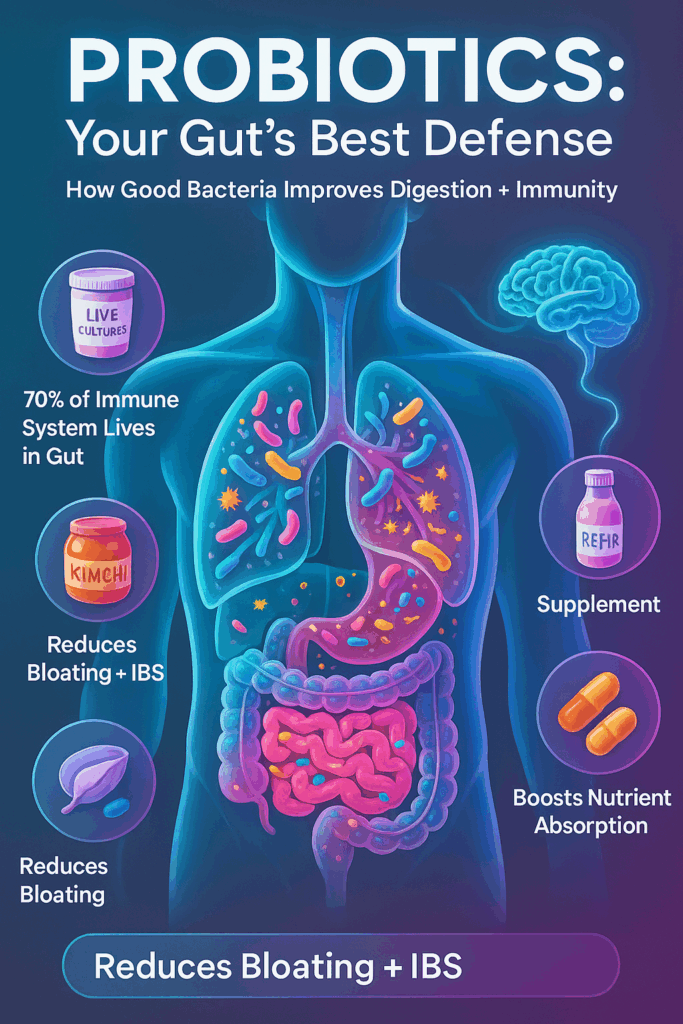7 Secrets of Probiotics for Gut Health
The human gut is home to trillions of microorganisms, collectively known as the gut microbiome. Among these, probiotics live beneficial bacteria play a crucial role in maintaining digestive health, immune function, and overall well-being. Let’s learn about Probiotics for Gut Health
In this comprehensive guide, we’ll explore:
- The science behind probiotics and gut health
- The best probiotic strains for different health needs
- How to naturally incorporate probiotics into your diet
- Common myths and FAQs about probiotics
By the end, you’ll understand how to optimize your gut health with the right probiotics.
What Are Probiotics and Why Are They Important?
Definition of Probiotics
Probiotics are live microorganisms, often referred to as “good bacteria,” that provide health benefits when consumed in adequate amounts. the complex ecosystem of bacteria living in your digestive tract.They primarily aid in maintaining a balanced gut microbiota, which is essential for:
- Digestion
- Immune defense
- Mental health (via the gut-brain axis)
- Nutrient absorption
How Probiotics Improve Gut Health
Research shows that probiotics:
✅ Restore gut flora after antibiotic use
✅ Reduce bloating and IBS symptoms
✅ Enhance immune response
✅ Support mental clarity and mood
(Table: Common Probiotic Strains and Their Benefits)
| Strain | Health Benefit | Found In |
|---|---|---|
| Lactobacillus acidophilus | Reduces diarrhea, improves lactose digestion | Yogurt, kefir, supplements |
| Bifidobacterium bifidum | Strengthens gut lining, fights harmful bacteria | Fermented foods, supplements |
| Saccharomyces boulardii | Prevents antibiotic-associated diarrhea | Probiotic supplements |
| Strain | Health Benefit | Found In |
|---|---|---|
| Lactobacillus acidophilus | Reduces diarrhea, improves lactose digestion | Yogurt, kefir, supplements |
| Bifidobacterium bifidum | Strengthens gut lining, fights harmful bacteria | Fermented foods, supplements |
| Saccharomyces boulardii | Prevents antibiotic-associated diarrhea | Probiotic supplements |
We have selected the best Probiotics for Gut Health for you
Best Probiotic Foods for Gut Health
Fermented Dairy Products
- Yogurt (look for “live and active cultures”)
- Kefir (richer in strains than yogurt)
- Aged cheeses (like Gouda and cheddar)
Non-Dairy Fermented Foods
- Sauerkraut (unpasteurized)
- Kimchi (Korean fermented veggies)
- Kombucha (fermented tea)
- Miso (Japanese fermented soybean paste)
Probiotic Supplements: What to Look For
When choosing a supplement, ensure it has:
✔ Multiple strains (diversity matters)
✔ High CFU count (10–50 billion CFUs for general health)
✔ Survivability (delayed-release capsules for stomach acid resistance)
Benefits of Probiotics for Different Groups
For Adults
- Reduced bloating
- Better nutrient absorption
- Enhanced immunity
For Children
- May reduce colic symptoms
- Supports immunity during early development
For Seniors
- May reduce antibiotic side effects
- Supports regular bowel movements
For Women
Supports urinary tract health
Helps manage vaginal microbiota
Probiotics and Digestive Disorders
Probiotics for IBS (Irritable Bowel Syndrome)
Studies suggest that Bifidobacterium infantis and Lactobacillus plantarum can:
- Reduce bloating
- Improve bowel regularity
- Decrease abdominal pain
Probiotics for Leaky Gut Syndrome
Certain strains (L. rhamnosus, B. longum) help:
- Strengthen the gut barrier
- Reduce inflammation
- Prevent toxins from entering the bloodstream
The Link Between Probiotics and Gut Health
Probiotics for gut health work by restoring and maintaining the natural balance of gut flora. This is essential for efficient digestion, nutrient absorption, and immune defense.
Scientific Evidence Supporting Probiotics
Recent studies have shown that probiotics can:
- Reduce symptoms of irritable bowel syndrome (IBS)
- Prevent and treat diarrhea (including antibiotic-associated and traveler’s diarrhea)
- Improve lactose digestion
- Help manage inflammatory bowel diseases like Crohn’s and ulcerative colitis
Common Myths About Probiotics
Myth 1: All Probiotics Are the Same
Fact: Different strains have different effects. Lactobacillus aids digestion, while Bifidobacterium supports immunity.
Myth 2: More CFUs = Always Better
Fact: Extremely high CFUs (100B+) aren’t necessary for most people and may cause bloating in sensitive individuals.
Myth 3: Probiotics Work Immediately
Fact: It takes 2–4 weeks of consistent use to notice benefits.
FAQs: People Also Ask About Probiotics for Gut Health
1. What’s the best time to take probiotics?
- Answer: Morning, on an empty stomach, or before bed for better survival through stomach acid.
2. Can probiotics help with weight loss?
- Answer: Some strains (L. gasseri, L. rhamnosus) may support metabolism, but they’re not a magic solution.
3. Are there any side effects of probiotics?
- Answer: Mild bloating or gas may occur initially as your gut adjusts.
4. Should I take probiotics with antibiotics?
- Answer: Yes, but 2–3 hours apart to prevent the antibiotic from killing the probiotics.

7 Probiotics for gut health
Conclusion: Optimizing Gut Health with Probiotics
Probiotics are a powerful tool for improving digestion, immunity, and overall health. By incorporating probiotic-rich foods and high-quality supplements, you can maintain a balanced gut microbiome.
Next Steps:
- Start with a multi-strain probiotic (10–50B CFUs)
- Eat fermented foods daily
- Monitor improvements in digestion and energy
Ready to transform your gut health? Tell us., What do you know about Probiotics for Gut Health? Share this guide and tag someone who needs it!🚀

